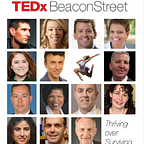Speaker rehearsal blast!
Less than two weeks to go, TEDxBeaconStreet Speakers gathered to run their talks for our Sparkplugs and Catalysts.
VisiCalc Founder Dan Bricklin started us off, asking: How many of you have ever run a business using a paper spreadsheet? Dan and his cofounder Bob Frankston are the reason only two people raised their hands. From Woodstock, Dan went to MIT, where he worked on pioneering software systems and taught people unfamiliar with computers how to use them. Dan’s career history reads like Computer History 101. (The picture of him dressed up as a calculator for Halloween was particularly special.) Then he envisioned a “magic blackboard” that would adjust all his numbers when he changed just one — and the future of computing was born.
Matt Carroll of the Boston Globe is a member of the Spotlight team who uncovered the abuse scandal that tarnished the Catholic church. He started the talk with a shot of his team in Hollywood, but he moved on quickly to what motivates him as a reporter: “Words have power.” Matt’s words changed the religious, social, and political landscape in a significant and permanent way. He admitted that “investigation is gritty, slow, and laborious,” and that the investigation cost about $1 million. But his efforts gave voice to those who had been silenced for decades and brought people to justice. Matt’s call to support investigative journalism resonated strongly with parents in our audience; as Dan Brickin pointed out, “This is not something a guy in an attic is going to do.”
Karen Feinstein led off explaining that Betty Friedan’s Feminine Mystique inspired her to work in women’s healthcare. She was shocked to find that over 100,000 people in Pittsburgh die every year from preventable medical error. So in 2013, Karen joined up with other healthcare leaders to transform this country’s health system, starting from the premise that 85% of healthcare decisions are made by women, but they represent only 27% of hospital board members. Karen and her team designed an “Uber-inspired” healthcare system, where users had options and information ahead of time.
We had 20 Speakers rehearsing, and so many people showed up excited that we had to split into two rooms!
Eric Schilling, an MIT PhD, talked about his work on Scratch. Scratch is an online coding tool for kids, where they can express themselves and experiment with creative imaging, and where they can share their personalities and interact in a safe space. This is particularly important to Eric, who found his most authentic self-expression through coding. TEDxBeaconStreet CEO John Werner pointed out that the next generation of coders will have gotten their start in Scratch. “Instead of talking about Dan [Bricklin] and Bob [Frankston], we’ll be talking about this platform in 20 years,” he said. John’s son Javi had heard of Scratch and was excited to hear about its founding.
Charles McKinney, Principal Urban Designer for New York City Parks, talked about how the most important resource he had in his job was his community.
Mike Festa talked about how he can bring virtual reality to furniture shopping. This isn’t just about making sure your new couch actually fits behind end table; it’s about imagining your world the way you want it to be. That’s the power of virtual technology. He calls this technology “photogrammatry,” and it turns out that the same technique was used to digitally reproduce historical artifacts that were destroyed by ISIS in the Middle East. Where can we go from here? To Makefield, a platform where we can envision our entire world as it could be. Our world will change rapidly in the next decade, due to global warming and other factors; Mike’s tool can help us preserve our world as we know it. To find us more, join us in November!
Arkadiusz Stopczynski builds tools to study things that are too complex to study entirely: human societies. We struggle to cross a city clogged with traffic and we battle chronic disease, but we can spread ideas across the world at the push of a button. Arkadiusz works on Living Labs, collecting online activity and publicly available data sources to understand the movements and questions of societies are large. He acknowledges that the collection of knowledge and data will only grow, and the question is how to make sure it is used safely and constructively — or as he puts it, “What happens when the microscope is in the hands of the good guys?”
Bob Frankston, cofounder of VisiCalc with Dan Bricklin, reminded us that we take for granted things like sidewalks, or telecommunications, taking for granted the infrastructure that allows us to move around. What are the elements of telecommunications, or of any technology, that we build into systems that we can use to do things like run Arkadiusz’s Living Labs at Google? The Internet vastly multiplies the resources at our fingertips, which expands the systems we can build. Bob’s talk has come a long way and all the MIT tech gurus in the audience were enthusiastic to hear how he envisions internet connectivity.
Deblina Sarkar is one of those MIT scientists, but she’s a neurologist, and she studies the brain. She explained how the brain is like a computer, which switches connections on and off and heats up when it’s very active. She explained how electrons jump over barriers to make connections, and energy is lost; but where does it go? Deblina is determined to stop that energy waste by allowing electrons to go through the barriers. It sounds risky, but Deblina promised us that quantum mechanics says it’s possible.
